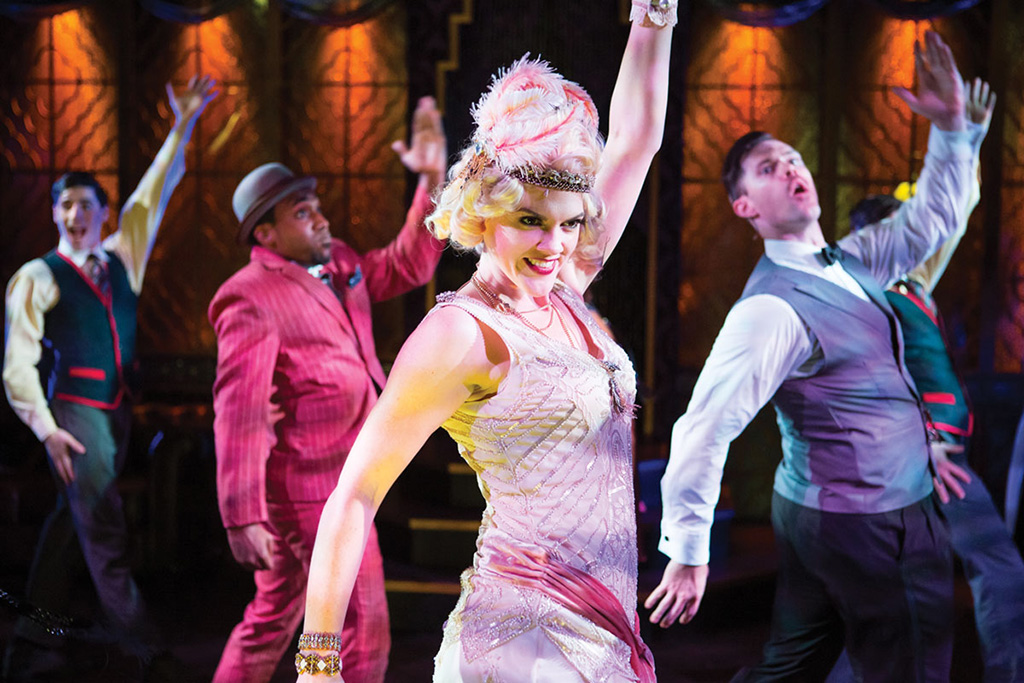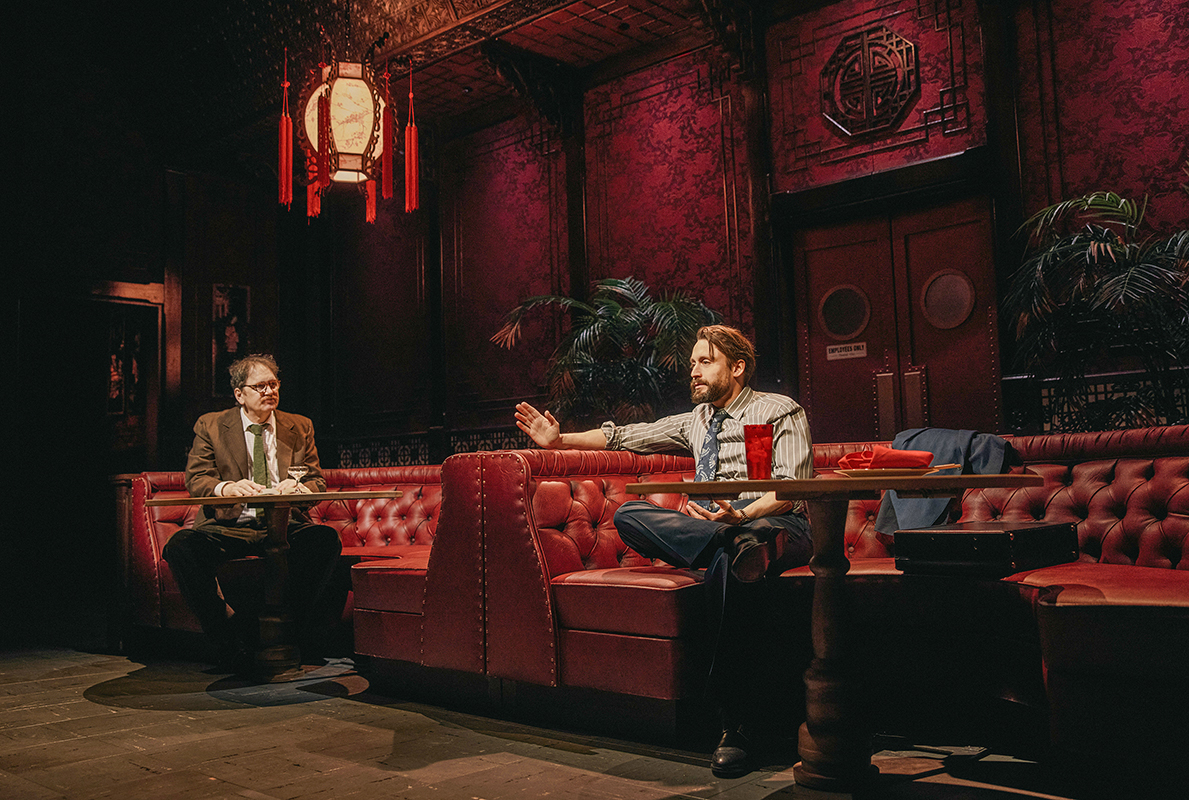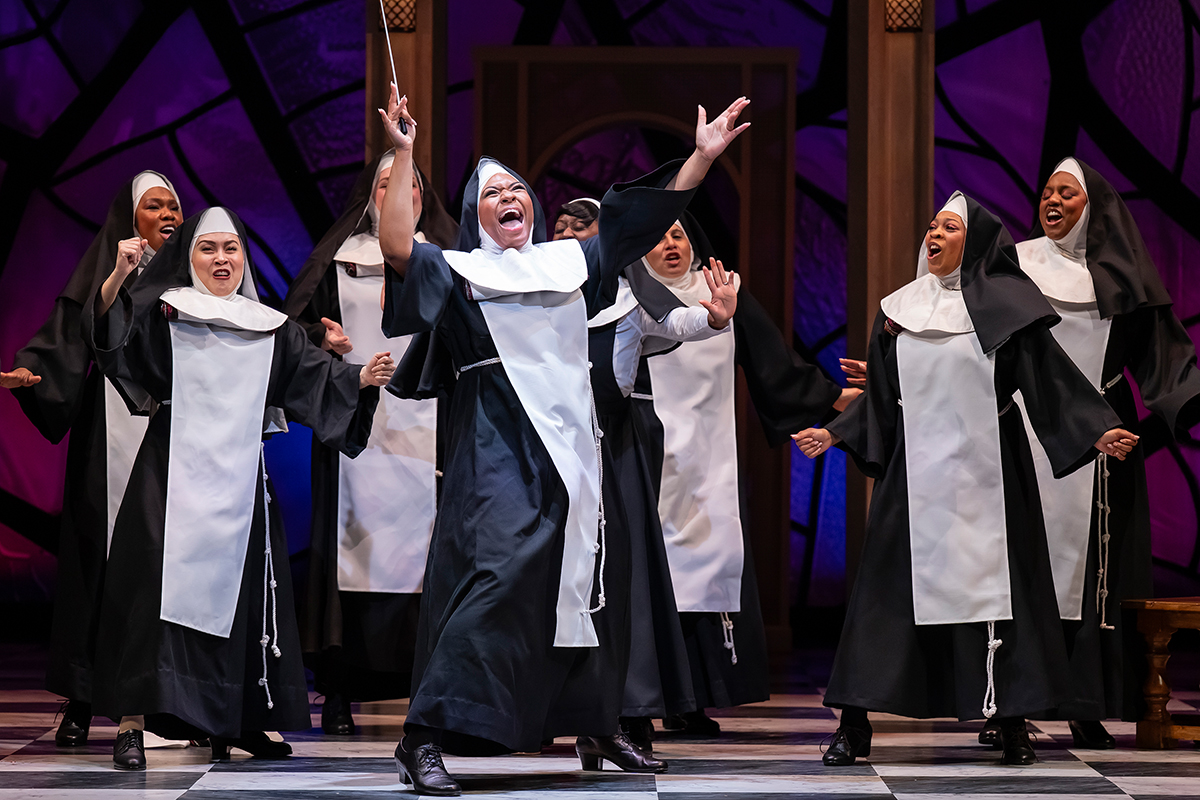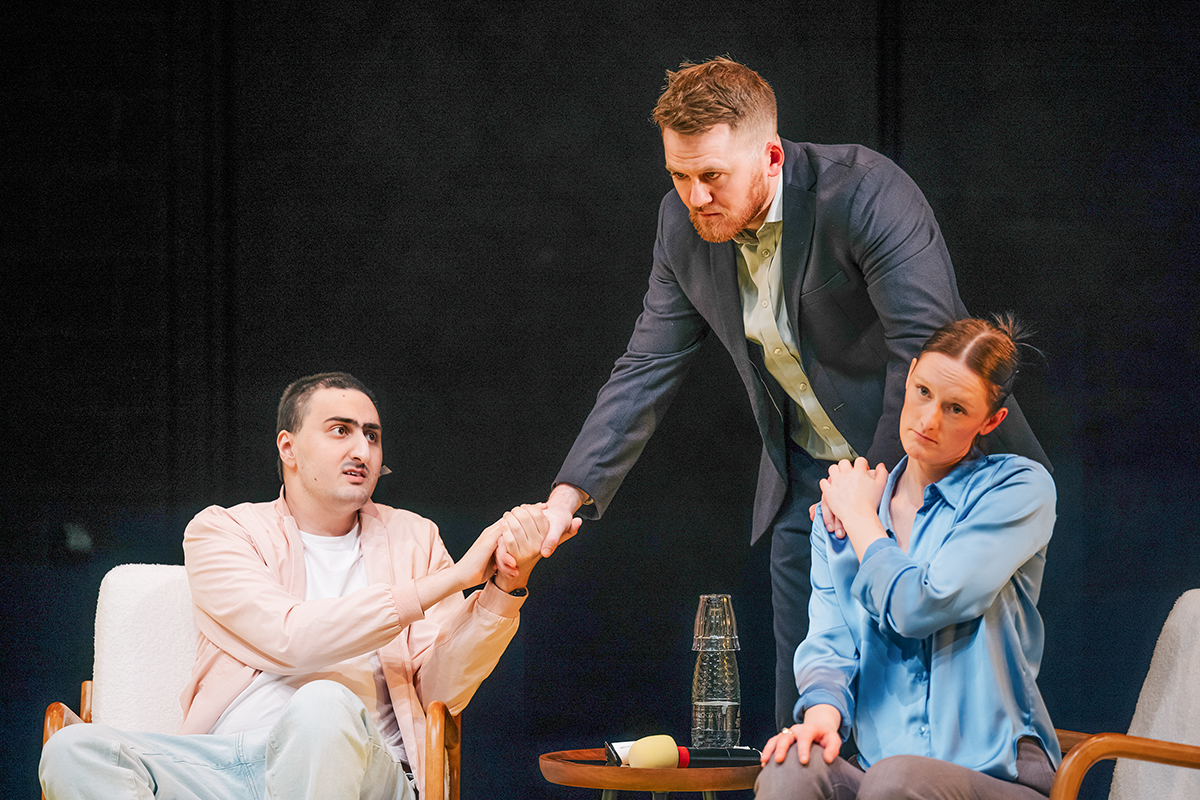Review: Constellation Theatre’s “The Wild Party”
The music and dancing delight, but the leads don't quite deliver in Constellation's The Wild Party
By André Hereford on September 28, 2017 @here4andre

The band is blowing, the hooch is flowing, and the guests are lit. But Constellation Theatre’s new production of The Wild Party (★★½) doesn’t lift off to the heights it should, in order to fully convey the dizzying descent and devastating impact when the party comes crashing down.
As surely as the stock market crash brought the curtain down on the Roaring ’20s, a bloody end does come to the swell party at the center of this Jazz Age musical from 1999, based on the eponymous narrative poem by Joseph Moncure March. The publication of March’s poem presaged the Great Depression by over a year, yet somehow perfectly captured the precipitous decline of a golden era in its story of Queenie and Burrs, two high-living lovers brought low by pride and jealousy.
Featuring a book, music, and lyrics by Andrew Lippa (Big Fish), The Wild Party presents the Queenie and Burrs romance as a straightforward drama of lust and angst, infused by an electrifying jazz-influenced score.
The music is as hot as ever in Constellation’s production, directed by Allison Arkell Stockman, and musical director Walter “Bobby” McCoy leads a swinging seven-piece band through the rag, rumba, and blues of Lippa’s stylistically varied, emotionally evocative tunes. Meanwhile, choreographer Ilona Kessell, a Helen Hayes nominee for her work on Constellation’s 2016 production of Urinetown, puts the ensemble through their vigorous paces with toe-tapping, tightly synchronized jumping and jiving that does its share to keep the party lifted. Costume designer Erik Teague has outfitted the cast in snazzy period suits and flapper gowns that generously complement all that jazz stepping. And Tony Cisek’s sets, while beautifully concealing the bandstand, create an environment somewhere between a speakeasy and grandma’s basement that feels just right.
Where the party sags is in the middle, with a lead foursome who are two players shy of a solid quartet. As Queenie, the hostess, Farrell Parker swaggers and stares with a glint in her eye that befits this doyenne of the free-and-easy bohemian scene. But her tart demeanor falters in song, and, although the show supplies Queenie with a few party-starting numbers, Parker’s interpretations don’t really raise the roof.

A vaudeville hoofer intent on serving a public comeuppance to her rough-handed lover Burrs, Queenie should come on like a minx hiding a dagger behind her back. Yet, Parker’s Queenie feels neither dangerous nor aggrieved enough to twist the knife as willfully as she does in her efforts to make her man suffer. Partly, that seems due to the scant onstage connection between Parker and Jimmy Mavrikes, as the sad clown Burrs.
Queenie and Burrs are a couple bound particularly by their intense sexual chemistry, and that sort of combustion doesn’t register here. Mavrikes sings and broods with passion, however, adding an undercurrent of dark unpredictability that helps drive suspense, as the sex and gin-soaked party builds to its climax.
Long before that, and even before the first act closes, the fabulous Kari Ginsburg’s entrance as Kate, a boozy, bedraggled partygoer who lusts after Burrs, is a climax unto itself, with the actress bursting onstage to perform “Look at Me Now.” A rousing force of talent, tenderness, and moxie, Ginsburg shifts the gravity onstage, projecting a maturity of experience that’s mostly missing from the other members of this uniformly young cast. Few in the cast convey scars of life as surely as Ginsburg. Where her Kate has been and where she’s going is of far more compelling interest than whether Queenie will steal away the handsome stranger who accompanies Kate to the party, the mysterious Mr. Black.

The fourth in this unbalanced love quadrangle, Mr. Black appears as this wild party’s It Boy, the beautiful face and form that enchants everyone in attendance — with perhaps the exception of licentious lesbian Madeline (a wonderful Rachel Barlaam). Unfortunately, neither Black, nor Lippa’s excellent songs for him, are done any service by Ian Anthony Coleman’s unpersuasive vocal performance.
Whatever mysteries Black might be hiding, there’s barely a hint of a past life in Coleman’s characterization. Luckily for the audience, there are plenty other intriguing guests worth meeting, and the shindig doesn’t ride completely on Queenie deciding to bet it all on Black.
The Wild Party runs until October 29th at Source Theatre, 1835 14th St. NW. Tickets are $25 to $55. Call 202-204-7741, or visit ConstellationTheatre.org.

‘Glengarry Glen Ross’ Is An Abusive Night of Theater
A barrage of racial epithets, mean speech, and misogyny permeates David Mamet's "Glengarry Glen Ross," in its third Broadway revival.
By Ryan Leeds on April 6, 2025
You would think that, by now, reasonable theatergoers would be exhausted by angry, self-serving bloviates who unleash profanities and cruel language on each other and anyone within earshot.
Obviously, there is more demand for it, as David Mamet's 1984 Pulitzer Prize-winning Glengarry Glenn Ross is back on Broadway for a third time.
And, like the unwitting suckers who fall into the clutches of this predatory group of real estate sharks, audiences are quick to drop top dollar to see a starry cast comprised of Bob Odenkirk as Shelley Levene, a past-his-prime salesman looking to increase his numbers, Bill Burr as Dave Moss, another older sales guy who huffs and puffs like the big, bad wolf, and Kieran Culkin as hotshot Ricky Roma, a slick smooth talker who has no time for excuses.
‘Sister Act’ at Ford’s is a Heavenly Good Time
Beloved characters, a committed cast, and fabulous musical numbers add up to a great time at Ford's Theatre's "Sister Act"
By André Hereford on March 29, 2025 @here4andre
Blessed with a sweet yet sturdy redemption story, Sister Act, based on the hit 1992 film starring Whoopi Goldberg, is a natural fit as a screen-to-stage musical.
The tale of lounge singer Deloris Van Cartier hiding out from her murderous crime boss boyfriend in the last place he'd think to look for her -- a convent full of singing nuns -- eagerly lends itself to set-pieces full of singing and dancing.
Composer Alan Menken and lyricist Glenn Slater's score of catchy original tunes are paired with a solid book by Cheri Steinkellner and Bill Steinkellner, and additional material by Douglas Carter Beane.
‘It’s a Motherf**king Pleasure’ is a Breath of Fresh Hilarious Air
Woolly Mammoth's funny and subversive "It's a Motherf**king Pleasure" is a joyously provocative evening out.
By Kate Wingfield on March 22, 2025
Arriving at a particularly tense time for the nation's capital, Woolly Mammoth's funny, subversive It's a Motherf**king Pleasure is a breath of fresh air. It's inoculated in that this is British-born and performed theater -- and the Brits really do get something of a pass when it comes to the kind of irreverence that would otherwise raise eyebrows and hackles.
Indeed, this special brand of immunity is tested in the first few frenetic minutes of Motherf**king where all energies are spent trying to decipher whether it's okay to laugh or if this is some kind of awareness-raising exercise (or, in other words, a trap) for the well-intentioned but woefully-not-getting-it.
Support Metro Weekly’s Journalism
These are challenging times for news organizations. And yet it’s crucial we stay active and provide vital resources and information to both our local readers and the world. So won’t you please take a moment and consider supporting Metro Weekly with a membership? For as little as $5 a month, you can help ensure Metro Weekly magazine and MetroWeekly.com remain free, viable resources as we provide the best, most diverse, culturally-resonant LGBTQ coverage in both the D.C. region and around the world. Memberships come with exclusive perks and discounts, your own personal digital delivery of each week’s magazine (and an archive), access to our Member's Lounge when it launches this fall, and exclusive members-only items like Metro Weekly Membership Mugs and Tote Bags! Check out all our membership levels here and please join us today!
The Magazine
-
Most Popular
 Gay Army Reserve Officer in Uniform Sex Video Scandal
Gay Army Reserve Officer in Uniform Sex Video Scandal  Signature Honors Mandy Patinkin in Emotional Celebration
Signature Honors Mandy Patinkin in Emotional Celebration  MISTR's Free DoxyPEP Leads to Huge Drop in STI Rates
MISTR's Free DoxyPEP Leads to Huge Drop in STI Rates  Police Barge into Walmart Restroom to Confront Butch Lesbian
Police Barge into Walmart Restroom to Confront Butch Lesbian  Air Force Reverses Ban on Pronouns in Email Signatures
Air Force Reverses Ban on Pronouns in Email Signatures  'Gray Pride' Protests Hungary's Ban on Gay Pride Marches
'Gray Pride' Protests Hungary's Ban on Gay Pride Marches  Open vs. Monogamous Love: What the Research Really Says
Open vs. Monogamous Love: What the Research Really Says  Hugh Bonneville Delivers a Show-Stopping Vanya
Hugh Bonneville Delivers a Show-Stopping Vanya  Trans Woman Arrested For Using Women’s Bathroom to Wash Hands
Trans Woman Arrested For Using Women’s Bathroom to Wash Hands  Transgender Blackhawk Pilot Sues Right-Wing Influencer
Transgender Blackhawk Pilot Sues Right-Wing Influencer
 Becca Balint: The Pride of Vermont
Becca Balint: The Pride of Vermont  Signature Honors Mandy Patinkin in Emotional Celebration
Signature Honors Mandy Patinkin in Emotional Celebration  MISTR's Free DoxyPEP Leads to Huge Drop in STI Rates
MISTR's Free DoxyPEP Leads to Huge Drop in STI Rates  A Potent (and Pricey) 'Good Night, And Good Luck'
A Potent (and Pricey) 'Good Night, And Good Luck'  Sarah Snook is Astonishing in Broadway's 'Dorian Gray'
Sarah Snook is Astonishing in Broadway's 'Dorian Gray'  'Gray Pride' Protests Hungary's Ban on Gay Pride Marches
'Gray Pride' Protests Hungary's Ban on Gay Pride Marches  Jared Polis Signs Law Repealing Colorado's Gay Marriage Ban
Jared Polis Signs Law Repealing Colorado's Gay Marriage Ban  White House Ignores Reporters with Pronouns in Email Signatures
White House Ignores Reporters with Pronouns in Email Signatures  White House Demands NIH Study Transgender Transition "Regret"
White House Demands NIH Study Transgender Transition "Regret"  Air Force Reverses Ban on Pronouns in Email Signatures
Air Force Reverses Ban on Pronouns in Email Signatures
Scene
Metro Weekly
Washington's LGBTQ Magazine
P.O. Box 11559
Washington, DC 20008 (202) 638-6830
About Us pageFollow Us:
· Facebook
· Twitter
· Flipboard
· YouTube
· Instagram
· RSS News | RSS SceneArchives
Copyright ©2024 Jansi LLC.











You must be logged in to post a comment.